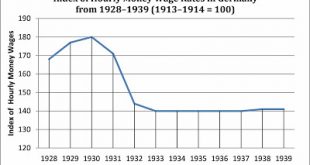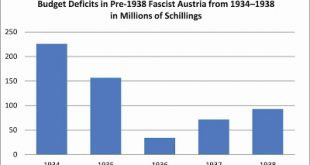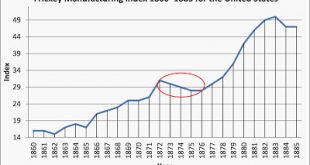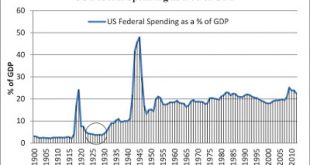This is an older and short video in which Steve Keen is interviewed, and gives a short summary of Keynes’ economic ideas:[embedded content]An important issue is Steve Keen’s point that Neoclassical synthesis Keynesianism was a misguided and distorted development of the General Theory and Keynes’ later articles, even though Keynes did allow this to happen in Chapter 18 of the General Theory, where he played down the role of uncertainty (as had been stressed in Chapter 12). As King notes, if...
Read More »Keynes’ Life: 1931
I give an account below of Keynes life in 1931.January–May 1931 On 27 January 1931, Friedrich Hayek arrived in London at the London School of Economics (LSE). Hayek gave four evening lectures at 5 p.m. from 27 to 30 January 1931 on “Prices and Production” (Howson 2011: 196), and these lectures were later published in England as the book Prices and Production (September 1931), an exposition of the Austrian Business Cycle Theory (ABCT). Hayek himself had returned to Austria by 14 February...
Read More »Keynes’ Life: 1930
I give an account below of Keynes life in 1930, the second year of the Great Depression.January–May 1930 In January 1930, the second Hague Conference adopted the Young Plan on German reparations, and, as we saw in the last post, Keynes had corresponded with the leading members on the issue of German reparations. By early 1930, Keynes was beginning to think that an international slump was a possibility (Moggridge 1992: 483).On 19 January 1930, Keynes’ friend Frank Plumpton Ramsey died after...
Read More »Keynes’ Life: 1929
I give an account below of Keynes life in 1929, the year in which the Great Depression began.January–May 1929 Keynes taught at Cambridge in the first half of the year. The teaching periods at Cambridge were divided into three terms:October–December – Michaelmas January–March – Lent or January term April–June – Easter term.On 18 January 1929, Ludwig Wittgenstein returned to Cambridge, and Keynes met him when he arrived, and allowed Wittgenstein to share his rooms at Cambridge until February...
Read More »Victoria Chick on the History of Post-Keynesian Economics
Victoria Chick gives a talk here on some aspects of the history of Post-Keynesian economics. This talk appears to have been given in 2018:[embedded content]
Read More »Proto-Keynesians in the Last Years of Weimar Republic Germany
It is well known that the Great Depression hit Weimar Republic Germany particularly hard. There was severe unemployment, and the wage and price deflation was also severe, as can be seen in these graphs (with data from Mitchell 1992): Moreover, the wage and price deflation did not bring about a rapid or effective recovery. Austerity policies clearly failed in the Weimar Republic, and a number of German businessmen, bureaucrats, journalists, and unorthodox economists were driven to advocate...
Read More »Three Cheers for Tucker Carlson!: Heroic Economic Populist
Tucker Carlson channels left-wing economics in this debate with the free market, Neoconservative charlatan Ben Shapiro: [embedded content]You have to admire Tucker Carlson for this, despite the gushing praise for the ill-defined concept of “capitalism.” Shapiro, in response, mouths utterly dumb, empty, meaningless drivel.Tucker Carlson is easily the best thing to ever happen to the brain-dead Conservative media in America, probably in living memory. Tucker has morphed from a pointless...
Read More »Austerity in Pre-1938 Fascist Austria
From 1933 to 11 March 1938, Austria was ruled by the clerical fascist Fatherland Front in a regime called the Austrian Federal State.The two dictators of Austria in this period were as follows:Dictators of the Austrian Federal State 5 March 1933–25 July 1934 – Engelbert Dollfuss 29 July 1934–11 March 1938 – Kurt SchuschniggAlthough the Fatherland Front had some anti-capitalist elements, the fact is that in power Engelbert Dollfuss and Kurt Schuschnigg pursued spending cuts, austerity, budget...
Read More »Academic Agent versus Reality on the US Industrial Recession of 1873–1878
In this recent stream on economics, Academic Agent attempts to defend Rothbard’s views on the American economy in the 1870s.[embedded content]In my Twitter debates on this issue with Academic Agent – who is an unusually ignorant libertarian – I directed him to my post here.I said explicitly in that post that, while Rothbard was correct that there was no depression in the sense of a fall of GDP/GNP of 10% or more, Rothbard was nevertheless wrong to claim that the 1873–1878 period saw...
Read More »Academic Agent on Herbert Hoover: A Critique
Academic Agent’s video on Herbert Hoover is below:[embedded content]First of all, it is true that Hoover was not a strict liquidationist. He supported limited interventionism, and was – for his time – a type of corporatist Republican. But was Hoover an “interventionist” relative to the interventions that became commonplace in Western mixed economies after 1933 and certainly after 1945? The answer is: no, Hoover was relatively non-interventionist in relation to the mixed economies of the...
Read More » Socialdem. 21st Century
Socialdem. 21st Century




